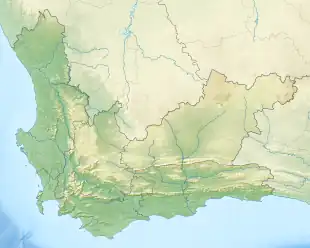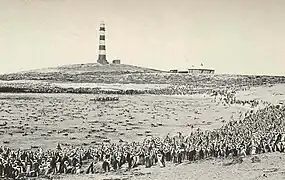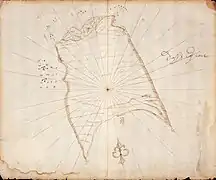Dassen Island
Dassen Island is an uninhabited South African island in the Atlantic Ocean. It is situated about 10 km (6 mi) west of Yzerfontein and 55 km (34 mi) north of Cape Town. The flat and low-lying island measures about 3.1 km (1.9 mi) long northwest-southeast and 1 km (0.6 mi) wide, with an area of 2.73 km2 (1.05 sq mi).[3] It is a proclaimed nature reserve.
Native name: Dasseneiland | |
|---|---|
 | |
 Dassen Island | |
| Geography | |
| Coordinates | 33°25′24″S 18°05′14″E |
| Area | 2.60 km2 (1.00 sq mi) |
| Administration | |
| Demographics | |
| Population | 0 (2011)[1] |
| Official name | Dassen Island Nature Reserve |
| Designated | 29 March 2019 |
| Reference no. | 2383[2] |
In Dutch "das", the plural being "dassen", is a badger (Meles meles). In Dutch/Afrikaans the word "dassie" means "rock-hyrax" or "rock-badger" and the island is named after the colonies of hyraxes (Procavia capensis) encountered there by the discoverers. Named Ilha Branca ('white island') by the early Portuguese mariners, it was renamed Elizabeth Eiland by Joris van Spilbergen in 1601. The form Dasseneiland (Dutch/Afrikaans) is preferred for official purposes.[4] It was also occasionally referred to as Penguin Island.[5]
The island is underpinned by a fine-grained tourmaline granite, with a few zones of biotite granite. The intrusive rocks (late Precambrian) are in part covered by sand. Along much of the shoreline large, rounded boulders protrude from the sand to heights just above the high water mark. Although temporary pans form during the wet season (winter) in the interior, there is in general little fresh water on the island.
Except on its eastern side, Dassen Island is surrounded by reefs. Many ships have been shipwrecked here.
African penguin colony
Rocky paths on the island have been worn by generations of penguins coming ashore to roost and nest.[6] The island is home to a breeding colony of African Penguin which is in decline. In the 1950s it was home to tens of thousands of the animals.[7] In 1975 the population was an estimate 60,000 birds. In the year 2000, the population was an estimated 56,000.[8]
The population has been adversely impacted by the commercial exploitation of their eggs,[9] collection of guano (which the birds require to burrow in), and the overfishing of prey species (including pilchard). Dassen Island is also on a major shipping route, and in 1975, roughly 650 oil tankers passed by each month. Oil pollution stemming from bilge dumping and occasional major oil spills (such as the MV Treasure oil spill) have also impacted the population.[10]
 African penguin (Spheniscus demersus).
African penguin (Spheniscus demersus). Nautical chart s. XVII
Nautical chart s. XVII
External links
References
- "Main Place "Dassen Island"". Census 2011. Retrieved 29 August 2013.
- "Dassen Island Nature Reserve". Ramsar Sites Information Service. Retrieved 10 September 2019.
- "Avian Demography Unit: Dassen Island". Archived from the original on 2012-05-27. Retrieved 2010-03-13.
- Raper, Peter E. (1987). Dictionary of Southern African Place Names. Internet Archive. p. 130. Retrieved 28 August 2013.
- "Penguin Isle preferred (Dassen Island, 1956)". The Morning Call. 1956-02-21. p. 5. Retrieved 2020-05-09.
- "African penguins of Dassen island (1981)". The Times and Democrat. 1981-07-04. p. 6. Retrieved 2020-05-09.
- "Penguin Isle preferred (Dassen Island, 1956)". The Morning Call. 1956-02-21. p. 5. Retrieved 2020-05-09.
- "Flight of the African penguin (2000)". Tampa Bay Times. 2000-07-08. p. 2. Retrieved 2020-05-09.
- "Penguin playmates & egg exports, Dassen Island (1954)". Press and Sun-Bulletin. 1954-10-23. p. 4. Retrieved 2020-05-09.
- "South African penguins of Dassen Island (1975)". Colorado Springs Gazette-Telegraph. 1975-04-13. p. 6. Retrieved 2020-05-09.